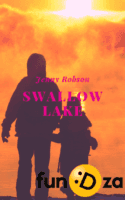“Tumi, my child. It is time you must pack. Tomorrow early the Transport will be here.”
“Ee, Nkuku,” I answer. But I do not get up.
We are sitting high on the hill, my grandmother and I, with our backs against her reed hut. The ROs (Rescue Operation) offered to build her a house of bricks. They are always offering things, the ROs, every time they visit with their helicopter blades throwing up sheets of sand.
But grandma refused. She did not want a brick house. Bricks do not smell sweet like reeds. Nor are bricks soft against your skin when you lean back to watch the Afrikan sun set over Swallow Lake.
They are fiery orange now, the sun and the lake both. The water looks alive, dancing and twinkling with the sun’s light. Even though no birds will ever swoop down, no small buck will ever drink from its deadly edges. And no fishermen will ever cast their lines into its lifeless depths.
“They said you must take only one case, Tumi my child. They say you cannot bring too much weight on their helicopter. Have you decided: will you pack your mother’s shawl?”
But I don’t want to talk about packing. I don’t want to think about leaving. This is my home! Lentswe la Rona. That’s what we call it. Simply: Our Hill. With our small cluster of homes on the flat, tree-less summit: one reed hut and six RO brick houses.
Just as our village in the valley was once called simply Motse wa Rona: Our Village. Back in the days when there was a village. And countless reed and mud houses. Brick ones, too, in Ward 20 and above.
My friends Neo and Lindiwe are packed already. And excited. They come to join us, greeting my grandmother politely. But she has closed her eyes and doesn’t reply. My grandmother often takes naps now that she is old. And weary from all she has endured.
My friends squat down in the sand so their cheeks glow golden in the sunset rays.
“Just think, Tumi!” says Neo. “Tarred streets and cars. And lots of TV channels to watch, not just boring education programmes. Movies and music videos and soapies! And cellphones so you can talk to your friends even when you are out! Yes, and there’s a proper school there too, full of other teenagers. Lots of teenagers! Not just three of us like here. I swear: we will never be bored again. There will always be something to do!”
“Even the date we are leaving is special,” adds Lindiwe. “Have you seen? Tomorrow is the longest day of the year right? But it gets better: Twenty-first December of twenty-one twelve, right? Just look!”
Lindiwe writes the date with a stick in the sand – 21.12. 2112 – so I can appreciate its magical properties.
“That must be a sign, right Tumi? It’s a sign! A sign that wonderful things await us. By Christmas we will be in the settlement in Siberia. I bet there will be huge Christmas parties. Imagine!”
***
Tell us: This story is set in an imagined future, but Global Warming is very real and will affect everyone. What effects of Global Warming have you already heard of, if any?


